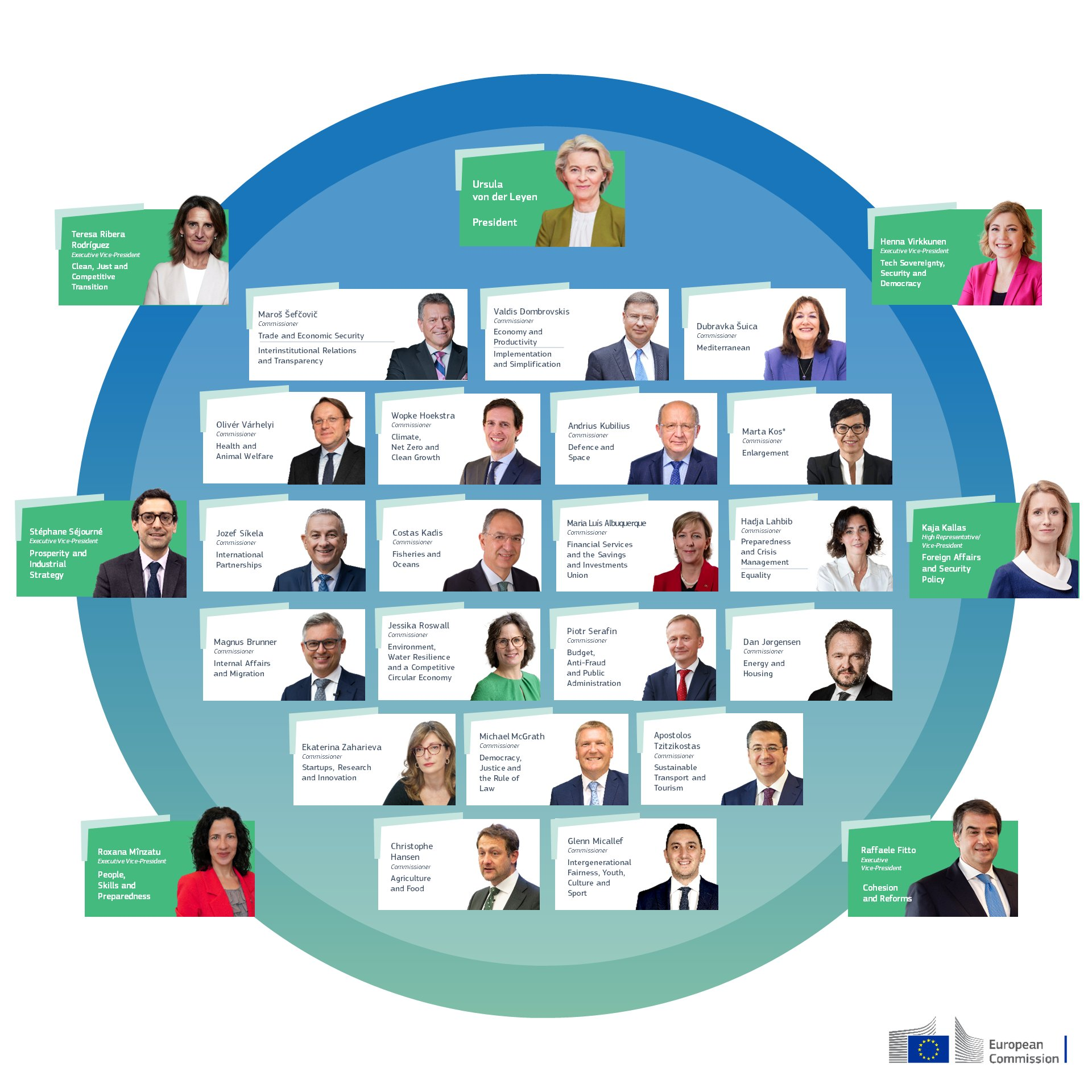Ursula Von der Leyen presents the new EU Commission
The President of the EU Commission, Ursula von der Leyen, confirmed in July for a second term, has made official today the team of new commissioners, who will make up the executive of the European Union for the next five years. “Prosperity, security and democracy are the priorities of the next Commission”, said the former German Defense Minister, who before appearing at the press conference illustrated her new team to the group leaders of the parties elected to the European Parliament.
To these themes, according to von der Leyen, are added: “the strengthening of technology; a more solid industrial strategy; further development of European regions through cohesion policy; greater social prosperity through vocational training; the defense of the European social model; and a more dynamic external dimension”.
Then von der Leyen announced the appointment of six executive vice-presidents – including Minister Raffaele Fitto, appointed by Prime Minister Giorgia Meloni, who received the delegation for Cohesion and Reforms. “He will be responsible for the portfolio that deals with cohesion policy, regional development and cities,” von der Leyen said. “We will rely on his extensive experience to help modernise and strengthen our cohesion, investment and growth policies.”
Along with the Fratelli d’Italia representative, the new vice-presidents include four women and two men. However, despite the Commission president saying she had “worked intensively” on gender balance with member states, overall von der Leyen managed to have only 40 percent women compared to 60 percent men in her team. While stressing that this is still an improvement, von der Leyen acknowledged that on this issue, “what we have achieved, there is still a lot to do”.
“The key message is that wherever we come from, whatever our role: we all have to work together,” the President of the EU Commission said. “We will have open debates. We will all be independent in our thinking and action. And we will all take responsibility for what has been agreed. This is the team I am presenting today.” Below is the full list of all the vice-presidents and commissioners and their roles in the new EU Commission:

Here’s who the new European commissioners are and what role they will play
Ursula von der Leyen (Germany) – president
Teresa Ribera Rodríguez (Spain) – Executive Vice-President for Clean, Fair and Competitive Transition and responsible for Competition Policy
Henna Virkkunen (Finland) – Executive Vice-President for Technology Sovereignty, Security and Democracy and responsible for Digital and Frontier Technologies
Stéphane Séjourné (France) – Executive Vice-President for Prosperity and Industrial Strategy and responsible for the Industry, SMEs and Single Market portfolio
Kaja Kallas (Estonia) – Executive Vice-President and High Representative for Foreign Affairs and Security Policy of the EU
Roxana Mînzatu (Romania) – Executive Vice President and Head of Human Resources, Skills and Readiness
Raffaele Fitto (Italy) – Executive Vice-President for Cohesion and Reforms
Maroš Šefčovič (Slovakia) – Trade, Economic Security, Customs Policy, Institutional Relations and Transparency
Valdis Dombrovskis (Latvia) – Economy and Productivity, Implementation and Simplification
Dubravka Šuica (Croatia) – Mediterranean and demography
Olivér Várhelyi (Hungary) – Animal Health and Welfare
Wopke Hoekstra (Netherlands) – Climate, net zero emissions and green growth
Andrius Kubilius (Lithuania) – Defense and Space
Marta Kos (Slovenia) – Enlargement and Eastern Neighbourhood
Jozef Síkela (Czech Republic) – International Partnerships
Costas Kadis (Cyprus) – Fishing and Oceans
Maria Luís Albuquerque (Portugal) – Financial Services and Savings and Investment Union
Hadja Lahbib (Belgium) – Humanitarian Aid, Crisis Preparedness and Management and Equality
Magnus Brünner (Austria) – Home Affairs and Immigration
Jessika Roswall (Sweden) – Environment, Water Resilience and Competitive Circular Economy
Piotr Serafin (Poland) – Budget, Anti-Fraud and Public Administration
Dan Jørgensen (Denmark) – Energy and Housing
Ekaterina Zaharieva (Bulgaria) – Research, Innovation and Startups
Michael McGrath (Ireland) – Democracy, Justice and the Rule of Law
Apostolos Tzitzikostas (Greece) – Transport and Sustainable Tourism
Christophe Hansen (Luxembourg) – Agriculture and Food
Glenn Micallef (Malta) – Intergenerational Equity, Youth, Culture and Sport
How is the European Commission called?
The European Commission is composed of 27 members, including the President, equal to the number of countries that are part of the EU. The process of appointing future European Commissioners involves first the European Council, that is, the Heads of State and Government of each Member State, and then the European Parliament.
Each Member State proposes the name of a candidate commissioner to the President of the EU Commission, in this case Ursula von der Leyen. It is she, once she has the full team, who goes before the European Parliament.
At that point, each candidate is submitted to the European Parliament for examination, in specific parliamentary hearings relating to the area of competence. At that point, the European Parliament and the European Council vote for approval. Once the President of the Commission and the Commissioners have obtained the approval of the Parliament, it is the Council that officially appoints them, acting by qualified majority.
What is the EU Commission and what does it do?
The European Commission is one of the main institutions of the EU. It is the executive body and has the role of promoting the legislative process. Each Member State appoints its own Commissioner, who enjoys maximum decision-making independence from the government of his or her Member State. Having the power of legislative initiative, the EU Commission proposes the adoption of EU legislative acts, which are then approved by the Parliament and the Council. The EU Commission also has the power to manage the expenditure of structural funds. Its headquarters are in Brussels, in the Berlaymont building.
#Ursula #Von #der #Leyen #presents #European #Commission #Parliament